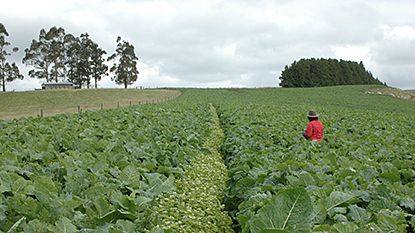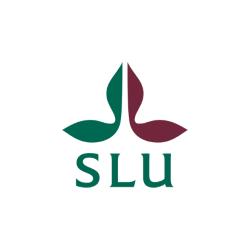
Pressmeddelande -
Flower strips most effective in moderately complex agricultural landscapes
The effectiveness of flowering strips of buckwheat in Brassica olearea fields on biological control of pests was best in moderately complex landscapes, such as on the photo. Photo: Mattias Jonsson
It is in moderately complex landscapes that it is most effective to deploy local conservation management measures to enhance biodiversity, such as flowering border zones. The SLU-researcher Mattias Jonsson has together with colleagues from New Zealand, Australia and USA recently published evidence for this in Journal of Applied Ecology.
To be able to feed an increasing human population it is necessary to intensify agricultural production. However, this is often done at the expense of biodiversity and the delivery of ecosystem services, through e.g. natural enemies of crop pests and pollinating insects.
In order to reduce the negative effects of intensive agriculture on biodiversity, farmers can undertake conservation management measures e.g. to increase the availability of alternative food and shelter for natural enemies such as lady beetles and parasitoid wasps.
However, flowering border zones and similar measures do not always achieve their intended effect. It has been shown that local conservation management measures are most effective at enhancing pollinators in moderately complex landscapes, but it has so far not been established if this is also the case for biological control of pests such as aphids and diamondback moth.
In an international study, led by the ecologist Mattias Jonsson at SLU, researchers have now tested the effect of strips with flowering buckwheat on biological control (proportion parasitised pests and number of pests) and on crop yield.
The flower strips were placed in agricultural landscapes with different levels of complexity, from complex landscapes with high cover of semi-natural grasslands to landscapes more dominated by annual crops. The study was conducted in the region of Canterbury on the south island of New Zealand.
– As expected it turned out that flower strips were not most effective in the most complex landscapes, but in the moderately complex ones, says Mattias Jonsson
The likely reason for this is that in the most complex landscapes alternative food sources and sites for shelter are already plentiful, whereas in moderately complex landscapes there is a lack of such resources. In the simplest landscapes that are entirely dominated by annual crops there is often a lack of natural enemies and therefore the effect of local conservation management measures are also likely to be ineffective in such landscapes.
The conclusion by the researchers is that the composition of the agricultural landscape is critical for the effectiveness of local measures to improve ecosystem services such as biological control.
– By directing measures to improve ecosystem services to fields in moderately complex landscapes, a farmer is likely to get most out of the money spent, says Mattias Jonsson
Press photo
(Can be used when publishing articles about this press release. Photographer must be acknowledged)
Further reading
- Experimental evidence that the effectiveness of conservation biological control depends on landscape complexity, Journal of Applied Ecology
 .
. - Researcher Mattias Jonsson
- Department of Ecology, SLU
Contact information
- mattias.jonsson@slu.se, +46-72-532 65 56
Ämnen
Kategorier
SLU:s vision: SLU är ett universitet i världsklass inom livs- och miljövetenskaper.


